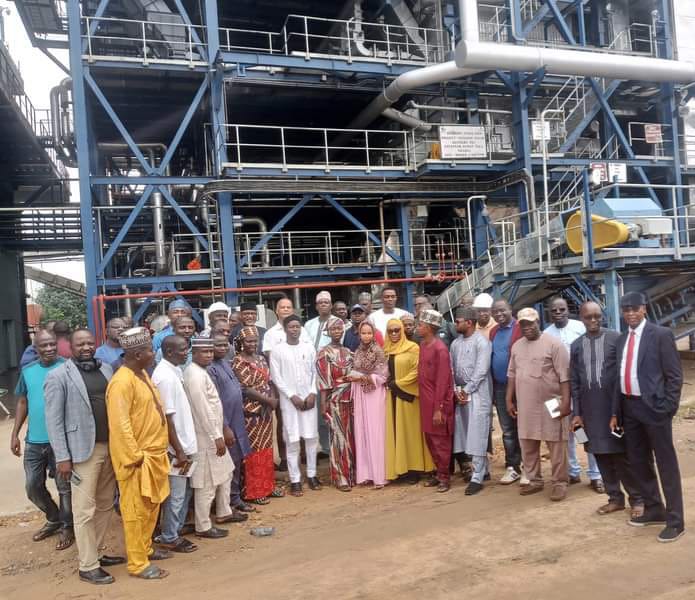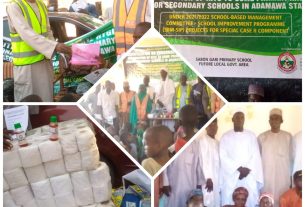With a massive expansion project almost completed, the Dangote Sugar Refinery (DSR), Numan, is looking impressive.
Newsmen conducted round the refinery complex towards the weekend saw a prosperous sugar producing enterprise taking shape, and observed how the company is enriching its host communities in many ways.
Expansion of the refinery itself has gone far, with the company envisaging that when active sugar production resumes in two months’ time, the refinery would be crushing 15,000 tonnes of cane per day (tcd), up from initial 3,000 tcd.
Part of the information gathered during the media tour of the DSR complex on Thursday, October 12, is to the effect that the expanded Dangote Sugar Refinery would be producing enough byproduct to generate electricity that will not only power all its operations but leave surplus for the national grid.
Disclosing this to the newsmen on the facility tour, Chief Executive Officer of the company, Mr Chinnaya Sylvain, said that in the process of crushing sugarcane, harvested mainly from the expansive sugar plantations within the DSR complex, enough byproduct called bagasse will be produced which will be utilized to generate anticipated 32 megawatts of electricity.
Part of this quantum of energy, he said, will be used by the manufacturing complex and the surplus energy given to the national grid.
Another revelation of the October 12 media tour of the Dangote establishment in Numan is the Dangote Refinery group of schools: a primary school with 764 pupils and a secondary school with 548 students, both located within the refinery premises, both offering free education, and both staffed by teachers employed and paid by the company.
To underline the community responsibility nature of the schools, the students and pupils are admitted not only from among the children of the refinery workers but also from families in the host communities.
An expansion scheme of the DSR which involves empowering of outgrowers to contribute sugarcane to the stock available to the refinery is another way the DSR reaches out to members of the host communities.
The outgrowers scheme, as attested to by some of the beneficiaries, is one in which nearly a thousand farmers are enabled by the company to cultivate sugarcane and sell to the refinery.
According to an official, the company works closely with indigenous farmers in the localities to improve the community farmers’ participation in the larger Sugar for Nigeria Project, to boost the farmers’ income while improving cane quality and yields.
The official explained that the company introduced Sugarcane Outgrower Schemes Model where space, land, seeds, fertiliser and other inputs are made available to host community farmers as a strategy to produce enough cane to meet targets set by the National Sugar Development Master Plan.
Beyond activities or institutions within the DSR or with bearings to the company, activities or projects dot the communities around the five local government areas that serve as the immediate environment of the expansive Dangote Sugar establishment which has its heart in Numan.
To be found in the communities are clinic, schools and other facilities built or renovated free of charge by the company.
Part of the media tour of Thursday was a visit to the paramount ruler of the Bachama Kingdom, Dr Daniel Shaga Ismaila, who affirmed that the DSR had been impacting on the lives of the people.
Daniel Ismaila who addressed his visitors at his palace in Numan through his Secretary, Mr Ambrose Tanyishi, said many people in the five LGAs of Numan, Demsa, Lamurde, Guyuk and Shelleng have benefitted from skills training and empowerment, among other interventions of the DSR.
“Idleness and social vices have dropped significantly as youths are engaged in factory work and farming activities to do with the sugar establishment,” the paramount ruler said.
The facility media tour of the Dangote Sugar Refinery in Numan followed a two-day climate reporting workshop organized by the Dangote group for journalists from across the North East which began in Yola on Wednesday, October 11.
The workshop was facilitated by Climate Africa Media Initiative and Centre (CAMIC) which mobilized resource persons who trained 50 journalists on the sustainable climate media workshop.
Executive Director of CAMIC, Aliyu Akoshile told participants that journalists are critical stakeholders in efforts to preserve a healthy environment.
Earlier in his welcome address, the Media Relations Manager (North) of the Dangote Group, Jibrin Abubakar, said the workshop was designed to equip journalists with skills on environmental reporting to protect humanity.
The participants were taught rudiments of environmental journalism by five resource persons drawn from the academia and environmental media spheres.
By Onimisi Alao




